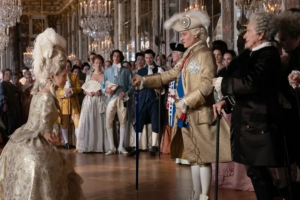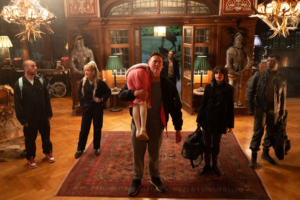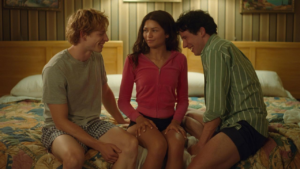Reviewed by GREG KING
Director: Greta Gerwig
Stars: Saoirse Ronan, Emma Watson. Florence Pugh, Eliza Scanlen, Timothee Chalamet, Laura Dern, Meryl Streep, Chris Cooper, Tracy Letts, Bob Odenkirk, Louis Garrel, James Norton.

This is the umpteenth film adaptation of Louisa May Alcott’s classic 1868 novel about the four March sisters coming of age in the post-Civil War period of America, but it will be remembered as one of the best. The novel was first filmed in a silent version way back in 1917, then there was a 1933 version that starred Katherine Hepburn, a 1949 version with Elizabeth Taylor, and a 1994 version directed by Gillian Armstrong that featured Winona Ryder and Christian Bale in the ensemble cast. This new version has been written and directed by Greta Gerwig, an actress who make an assured breakthrough as a director with her coming of age tale Lady Bird in 2017.
Gerwig gives the familiar material a more contemporary feel and sensibility as she addresses timely concerns of women wanting to establish their own identity, forge their own path in the world, free of the usual constraints of society. Alcott herself was an ardent feminist and her seminal novel addressed gender issues with her depiction of forthright and largely independent women. Her novel was semi-autobiographical in nature as it drew upon her own life and her relationship with her three sisters. Gerwig has similarly drawn upon aspects of Alcott’s own life to shape her adaptation, which gives it a freshness and vitality that distinguishes this film from many other versions which have slavishly drawn from the source.
The tomboyish Jo (played here by Saoirse Ronan) is an aspiring writer who dreams of becoming successful and living in New York. The more responsible and level headed Meg (Emma Watson, from the Harry Potter series) is an aspiring actress who puts her ambition on hold in order to marry and settle down, which is largely the expectation for women of that period. Amy (Florence Pugh, from Midsommar, etc) wants to be an artist and is pursuing her craft in Paris. Beth (played by Australian actress Eliza Scanlen, from Home And Away, etc) is a musical prodigy, but she is also sickly and dies young. The film also focuses on the prickly relationship between Jo and Laurie (Timothee Chalamet), her next-door neighbour who has adored her but whose romantic hopes she constantly rebuffs.
Gerwig takes a slightly different approach to the narrative structure. She bookends the film with scenes of Jo approaching a publisher, the acerbic Mr Dashwood (playwright and actor Tracy Letts) who gives her some advice. “Keep it short and spicy,” he tells her. The film then unfolds in a series of flashbacks that do not always follow a linear structure as it moves between two different time frames, giving us more insights into Jo’s life and the inspiration behind her characters and novel.
Gerwig brings energy to the film as she captures the chaotic, vibrant and happy atmosphere of the March household. We also get to meet their mother, played by a sympathetic and patient Laura Dern, and their imperious, haughty and independently wealthy eccentric Aunt March (a superb Meryl Streep). I wanted to see more of the sharp-tongued Streep as she seemed to be having a fine time here.
Chalamet brings plenty of charm and a boyish quality to his role as Laurie, but he also brings a hint of vulnerability to his performance. There is some great chemistry between Chalamet and Ronan, who appeared together in Gerwig’s Lady Bird as well. Bob Odenkirk is fine in a smaller role as their largely absent father, a military chaplain who has been away recovering from his war wounds. An almost unrecognisable Chris Cooper is also good in a small role as Mr Laurence, a broken man coping with his grief as best he can, who befriends Beth.
Production values are superb, with gorgeous costumes from Oscar winner Jacqueline Durran (Atonement, etc) and authentic period detail from Jess Gonchor (who regularly collaborates with the Coen brothers). The film has been nicely shot by Yorick Le Saux (A Bigger Splash, etc). The subtle yet emotional score from Alexandre Desplat mixes both classical and modern musical influences.
This is a beautifully looking, well-acted, poignant and intelligently directed contemporary adaptation of Alcott’s beloved story about sisterhood, and will open up this classic story for a whole new generation of filmgoers.
★★★☆



